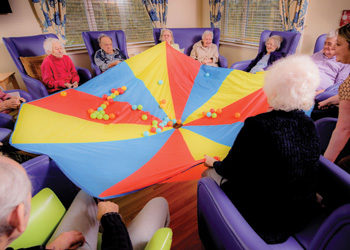News Archive
Maximise your time together
October 1, 2019
Visiting a friend or relative in a care home provides you with some precious, uninterrupted quality time together. Nial Joyce gives his advice on how to make the most of your visit

- Plan your visit: It is common for dementia patients to become agitated or confused towards the end of the day. This is known as ‘sundowning’. So, although it might seem convenient to pop in after work this is frequently the worst time and could result in a distressing visit that does not give an accurate representation of their true state. Speak to the care team and ask them to recommend the best time of day to visit. Maybe they are at their most active and alert first thing in the morning or after lunch? You might also want to call ahead so you can be prepared for whatever mood the resident is in that day. Be prepared to be flexible and set aside as much time as possible.
- Bring memories with you: If this is your first visit, or it has been a while since your last visit you may find it useful to bring something from home with you to spark conversation or help unlock memories. Is there an ornament or gift the resident has given you that has a story behind it? A picture album is a fantastic way of remembering happy times. Even if the resident is unable or unwilling to talk about the pictures, seeing them may bring great comfort to you both, and may also be a conversation starter for your next visit.
- Plan an activity: Even with limited mobility there are still plenty of things you can do together. You may want to go out into our garden or for a stroll along the seafront for an ice cream! Use one of our wheelchairs if this helps. Alternatively bring in a game or a jigsaw puzzle. This is a great activity for dementia patients as it can be non-verbal if necessary, helps with hand-eye coordination and is relaxing. You might even want to bring in a DVD of a favourite film or TV programme that you have enjoyed together in the past, so that you can watch this together.
- Join in with our activities: At Clifden House we run a range of individual and group activities to maximise our residents’ stimulation with the world around them. Visitors are encouraged to join in with these activities. Maybe you are visiting your father who you used to play pool with – come and have a go on our new snooker and pool table with him. Join in with one of our regular ‘knit and natter’ sessions. Speak to our care team to find out what your relatives’ favourite activities are and when this is timetabled.
- Stay for a meal: There is nothing more social than eating together. We encourage visitors to stay for lunch – our beach themed café serves nutritious, home cooked meals every day and we are happy to accommodate specific dietary needs.
- Bring someone with you: Is there a friend or neighbour that the resident used to see regularly but who now struggles to keep in touch? Offer to bring them with you. Dementia can be so isolating, with non-family members sometimes nervous of visiting or ‘intruding’. By inviting someone along you are doubling the opportunities for social simulation and conversation during your visit. Or, if the friend can’t come with you in person, get them to record a video message on your phone that you can show to the resident – and then record their reply!
- Keep trying: One of the most rewarding things you can do for someone with dementia is keep in touch. Dementia is a progressive disease and there are unlikely to be improvements in the resident’s condition. Although conversations may not always be possible, you will both gain great comfort by simply being together. Try to enjoy the time you have together while you can and cherish the memories you have.
Clifden House delivers highly qualified and personal care, to suit the needs of each dementia resident. Our aim is to facilitate each person to continue to live a fulfilling and active life, with privacy, dignity and security, for as long as possible.
Care plans are at the forefront of our delivery of care. The input, views and advice of family and residents’ representatives are very much encouraged – as this can help improve the quality of life for that person. The needs and requirements of each person are constantly changing, and care team leaders routinely reassess these needs.
